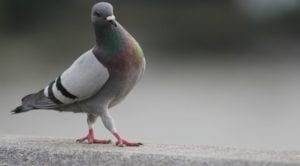
by Pigeon Patrol | Sep 7, 2023 | Bird Spike, Pigeon Predators, Pigeon Spikes, Pigeons, Pigeons in the News, Raccoons, Sparrows, UltraSonic Bird Control
On 8 January 2021, a pigeon was found dead, having been trapped in green netting installed by the Hong Kong Government, in order to deter birds from gathering under the cover of the Star Ferry Bus Terminus.

The green nets, along with bird spikes were installed several years ago to act as a deterrent, but the Hong Kong Pigeon and Dove Rescue (HKPDR), has urged authorities to remove the nets as pigeons have been injured or strangled to death by them. HKPDR said it had seen pigeons previously trapped by bird spikes and had contacted the relevant departments for response, but to no avail.
HKPDR said wildlife management should adopt a humane, animal-based, adding that it had earlier proposed more humane measures including setting up pigeon boxes. But all suggestions had been turned down by authorities. A social media campaign had also recently been launched to urge the Government to remove the green netting.
HKPRD also highlighted that some birds can enter via the holes in the net, but their wings and feet could get hooked onto the netting, causing them significant injuries, and rendering them unable to escape.
On Facebook, the HKPDR wrote:-
“The net is half installed which is causing unnatural and unnecessary death of pigeons. We urge the pier to stop all inhumane treatment and look at effective and humane ways to achieve their goal.”
A photo posted to Facebook by the group shows that the green net did not completely seal off the cover of the bus terminus. Several pigeons were able to stand above the green net and under the cover. HKPDR added that the government added bird spikes underneath the bus terminal cover, noting that it is not only ineffective but pigeons have to bear “unnecessary life danger.”
Source
Pigeon Patrol Products & Services is the leading manufacturer and distributor or bird deterrent (control) products in Canada. Pigeon Patrol products have solved pest bird problems in industrial, commercial, and residential settings since 2000, by using safe and humane bird
deterrents with only bird and animal friendly solutions. At Pigeon Patrol, we manufacture and offer a variety of bird deterrents, ranging from Ultra-flex Bird Spikes with UV protection, Bird Netting, 4-S Bird Gel and the best Ultrasonic and audible sound devices on the market today.
Voted Best Canadian wholesaler for Bird Deterrent products ten years in a row.
Contact us at 1 877-4-NO-BIRD,(604) 585-9279 or visit our website at www.pigeonpatrol.ca
Pigeon/Pigeon Patrol / Pigeons Roosing / Vancouver Pigeon Control / Bird Spikes / Bird Control / Bird Deterrent / PIgeon Deterrent / Surrey Pigeon Control / Pest / Seagull deterrent / Vancouver Pigeon Blog / Birds Inside Home / Pigeons in the cities / Ice Pigeons / What to do about pigeons / sparrows, Damage by Sparrows, How to Keep Raccoons Away, Why Are Raccoons Considered Pests / De-fence / Pigeon Nesting / Bird Droppings / Pigeon Dropping / woodpecker control / Professional Bird Control Company / Keep The Birds Away / Birds/rats/seagull/pigeon/woodpecker/dove/sparrow/pidgeon control/pidgeon problem/pidgeon control/flying rats/pigeon problems/ bird netting/bird gel/bird spray/bird nails/bird guard

by Pigeon Patrol | Jul 26, 2023 | Bird Spike, Pigeon Predators, Pigeon Spikes, Pigeons, Pigeons in the News, Raccoons, Sparrows, UltraSonic Bird Control
Pigeons like to land, roost, nest, and make a mess of your roof and they’re not easy to get rid of. Persistence, bird deterrents, and bird exclusion is the key.

Get rid of pigeons on the roof by removing food and water
Remove all food and water sources and never feed the pigeons! In addition, don’t let your neighbors feed the pigeons. The pigeons can eat at your neighbors and nest on your roof!
Pigeons mainly like to eat seeds and grains such as oats, wheat, corn, cereal, sorghum, rice, beans, barley, millet, peas, and sunflower. They also like to eat food scraps left behind by people, including bread crumbs and popcorn. Birdseed is their favorite because it contains a variety of seeds and grains.
When grains or seeds aren’t available pigeons will eat fruit, greens, and occasionally insects, earthworms, and snails. They especially like apples, grapes, berries, lettuce, spinach, and sprouted seeds.
Pigeons need a constant water source. If water isn’t readily available they will leave to find a more suitable place to live. They can find water in birdbaths, gutters, pools, decorative water fountains, puddles, ponds, streams, and even leaves after a rain storm.
Easy to use deterrents to get rid of pigeons on the roof
Aluminum foil, bird deterrent tape, shiny Mylar balloons, wind propelled shiny spinning objects, and plastic decoy scare owls are scary objects to pigeons. Place scary objects on the roof, under the eves, or on the patio. Pigeons don’t like or feel comfortable with scary objects next to their nesting area. They would rather live in a more peaceful environment. One thing to remember, when installing scary objects, is to move them around on a regular basis. Objects that stay in one position don’t scare pigeons.
Wind chimes may deter pigeons. You can give it a try. Pigeons have sensitive hearing and the noise from wind chimes can actually hurt their ears. Pigeons don’t particularly like to nest where loud noises come and go.
Sticky bird gel can also deter pigeons. Apply the sticky gel to your roof where the pigeons are landing and roosting. The gel will make the area uncomfortable for the pigeons to roost.
Metal bird spikes to get rid of pigeons on the roof
Metal anti bird perching spikes can be effective in the right circumstance. They can work pretty well depending on the location you put them. Install them on rooftop edges, ledges, chimneys, and anywhere you see the pigeons land, roost, or nest. Metal bird spikes are mostly maintenance free and can be a permanent solution to deter pigeons from your roof.
Metal anti-perching spikes are harder to install and are not aesthetically appealing.
Wire screens or mesh to get rid of pigeons on the roof
Exclusion is the best solution to pigeon problems in alcoves, around chimneys, under solar panels, on vents, and many other places on the roof. Exclusion with wire bird screen and mesh do offer a permanent solution to pigeon nesting problems.
Our company deals with pigeons nesting underneath solar panels on a daily basis. Solar panels are generally raised 5-12 inches above shingled or tiled roofs, thus creating a void between the panel and the roof. Pigeons can easily go underneath the panel to nest, poop, and make a noticeable and destructive mess. Most, if not all, rooftops that have solar panels need to have pigeons excluded from getting under the solar panels.
Installing wire bird screens or mesh can be difficult and hazardous. It requires being on the roof with tools, a lot of bending over (which is physically demanding), cutting the wire to the proper dimensions, and stapling or screwing on the wire. It is not advised for a home or business owner to install wire screens or mesh because it isn’t safe. You can fall off the roof and get seriously injured or die. To use this method, please hire a professional bird control company.
Bird netting to get rid of pigeons on the roof
If your roof is large and flat, bird netting is an excellent method to use to keep pigeons off your roof. It physically blocks the birds from the roof. If the birds can’t get on the roof, they can’t roost or nest. Bird netting is an exclusion method primarily used for large commercial bird and pigeon control.
A professional bird control operator should install bird netting. If not installed correctly the pigeons can still land on the area and get trapped, as well as other birds. This is cruel. Please hire a professional bird control company for bird netting. It will cost money but it is the safest and most humane way to have bird netting installed.
Remove bird nesting materials and droppings
It is important to remove all pigeon nesting and feces prior to excluding pigeons. Nesting materials and droppings left on the roof will continue to cause damage.
If the roof has a pitch, using a power washer is generally the best way to get rid of pigeon waste. Put a tarp on the ground next to the roof to catch the debris as it is rinsed off the roof. It will be much easier to clean up the pigeon feces on the ground if it is contained on a tarp. Wear a mask to prevent inhaling fumes from pigeon feces and wet the feces down before rinsing off. Histoplasmosis is zoonotic disease that can be found in pigeon feces. Zoonotic diseases are caused by harmful germs like viruses, bacteria, parasites, and fungi that are spread between animals and people.
If the roof is flat, you will have to wet the roof down (to prevent spreading contaminants and disease through the air), then rake and sweep up the pigeon waste prior to rinsing. Again, wear a mask to prevent inhaling fumes from pigeon feces.
Please be careful or better yet, call a professional. Using a power washer on the roof can be slippery and dangerous. Inhaling noxious pigeon feces can cause disease – it is a biohazard.
Importance of discouraging pigeons from nesting on your roof
Pigeons spread disease. There are over 60 diseases birds and their droppings can carry. Some of the diseases from pigeon droppings include salmonella, toxoplasmosis, cryptococcosis, St Louis encephalitis, E.coli, and more. In addition, fungus can grow in pigeon droppings which can cause histoplasmosis. Histoplasmosis is a respiratory disease that may be fatal. Pigeons are also carriers of pests including fleas, mites, ticks, and lice as well as West Nile virus. All of these diseases can pose a serious threat to human health.
Property damage is a big concern with pigeon nesting and droppings. Nests can clog gutters, ventilation pipes, chimneys, and damage electrical equipment. Damaged electrical wires from pigeon nests can even lead to fires. Pigeon droppings are very acidic. The droppings can actually eat away at the roof structure and cause roof leakage.
Pigeon droppings are unsightly. Nobody likes to see or walk on pigeon droppings.
People can slip and fall where pigeon droppings accumulate. When pigeon feces are fresh or rained on it is slippery.
Call a professional
Installing wire bird spikes, wire screens, wire mesh, or bird netting is difficult and hazardous. People can, and do, fall off roofs. People who fall off roofs get seriously injured and even die. It is best to call a professional bird control company when using these methods. Companies that specialize in removing and excluding bird pests (like pigeons) have the know how and safety equipment to get rid of pigeons in a safe and efficient manner from rooftops, alcoves, solar panels, chimneys, window sills, and other areas.
Source
Pigeon Patrol Products & Services is the leading manufacturer and distributor or bird deterrent (control) products in Canada. Pigeon Patrol products have solved pest bird problems in industrial, commercial, and residential settings since 2000, by using safe and humane bird
deterrents with only bird and animal friendly solutions. At Pigeon Patrol, we manufacture and offer a variety of bird deterrents, ranging from Ultra-flex Bird Spikes with UV protection, Bird Netting, 4-S Bird Gel and the best Ultrasonic and audible sound devices on the market today.
Voted Best Canadian wholesaler for Bird Deterrent products ten years in a row.
Contact us at 1 877-4-NO-BIRD,(604) 585-9279 or visit our website at www.pigeonpatrol.ca
Pigeon/Pigeon Patrol / Pigeons Roosing / Vancouver Pigeon Control / Bird Spikes / Bird Control / Bird Deterrent / PIgeon Deterrent / Surrey Pigeon Control / Pest / Seagull deterrent / Vancouver Pigeon Blog / Birds Inside Home / Pigeons in the cities / Ice Pigeons / What to do about pigeons / sparrows, Damage by Sparrows, How to Keep Raccoons Away, Why Are Raccoons Considered Pests / De-fence / Pigeon Nesting / Bird Droppings / Pigeon Dropping / woodpecker control / Professional Bird Control Company / Keep The Birds Away / Birds/rats/seagull/pigeon/woodpecker/dove/sparrow/pidgeon control/pidgeon problem/pidgeon control/flying rats/pigeon problems/ bird netting/bird gel/bird spray/bird nails/bird guard

by Pigeon Patrol | Jul 26, 2023 | Bird Spike, Pigeon Predators, Pigeon Spikes, Pigeons, Pigeons in the News, Raccoons, Sparrows, UltraSonic Bird Control
While out in nature, we all enjoy watching for and spotting birds. Even within cities, songbirds perched in trees add an enjoyable taste of the pastoral within these urban settings. However, pigeons may not be as welcome wandering the streets of our cities. Pigeons are used to being around humans, and they can be quite brazen about coming up to people asking for food.

You likely wont think about pigeons being a problem until they become one. These birds can be found all over the country and are quite adaptable as they nest anywhere from warehouses and commercial buildings to cliffs. They reproduce quickly, and as they grow in number, their feces will become a problem. They also eat almost anything they can find including scraps of food.
Pigeons actually aren’t native to North America. They were introduced to this continent from Europe in the 1600s, and, throughout history, humans used them for food and entertainment. As a result, this bird is quite comfortable around people.
Problems Pigeons Pose
While pigeons may seem like a normal resident in cities, they can pose a risk and become a problem if their population grows too large. Pigeons are especially a problem pest for commercial property owners and business owners.
- Pigeon droppings cause buildings to deteriorate more quickly and are costly to clean up.
- Their droppings are toxic. They not only smell, but they can also kill plants.
- Pigeon droppings pose a health risk spreading bacteria and diseases including histoplasmosis, cryptococcosis, psittacosis, and E.Coli.
- Pigeons can be an aesthetic issue making a building look unclean.
- Pigeons are bad for business as they will ruthlessly beg for and steal food.
- Lastly, pigeons sometimes get caught in machinery and roof vents which means costly repairs.
Overall, dealing with pigeons around your business will likely damage your property and your reputation.
Preventing Pigeons Around Your Business
One of the best ways to keep pigeons from posing an issue for your business is to prevent their population from growing around your building. There are some measures that you can take to keep pigeons away. Most effectively, you can eliminate areas where they like to roost or nest.
- Use netting to keep them from being able to nest.
- Prevent pigeons from landing using spikes or other methods.
- Use plastic snakes or scare balloons, although these are only a short term solution.
- Do not allow others to feed pigeons near your business.
- Use outdoor trash receptacles with lids.
However, because pigeons are so used to being around humans and are adept at making nests, it can be difficult to prevent them from becoming a problem once they start to gather.
Getting Rid of Pigeon Problems
Pigeons can be a problem year-long, and they can be hard to prevent and get rid of on your own. The best way to get rid of a pigeon infestation is to contact the specialists at Quik-Kill Pest Eliminators. We use effective methods such as netting and fogging to keep pigeons at bay.
Our pigeon control services also include a humane anti-roost system that keeps them from nesting using spikes, coils, and gels. In short, our services can remove pigeons while still keeping them alive.
Source
Pigeon Patrol Products & Services is the leading manufacturer and distributor or bird deterrent (control) products in Canada. Pigeon Patrol products have solved pest bird problems in industrial, commercial, and residential settings since 2000, by using safe and humane bird
deterrents with only bird and animal friendly solutions. At Pigeon Patrol, we manufacture and offer a variety of bird deterrents, ranging from Ultra-flex Bird Spikes with UV protection, Bird Netting, 4-S Bird Gel and the best Ultrasonic and audible sound devices on the market today.
Voted Best Canadian wholesaler for Bird Deterrent products ten years in a row.
Contact us at 1 877-4-NO-BIRD,(604) 585-9279 or visit our website at www.pigeonpatrol.ca
Pigeon/Pigeon Patrol / Pigeons Roosing / Vancouver Pigeon Control / Bird Spikes / Bird Control / Bird Deterrent / PIgeon Deterrent / Surrey Pigeon Control / Pest / Seagull deterrent / Vancouver Pigeon Blog / Birds Inside Home / Pigeons in the cities / Ice Pigeons / What to do about pigeons / sparrows, Damage by Sparrows, How to Keep Raccoons Away, Why Are Raccoons Considered Pests / De-fence / Pigeon Nesting / Bird Droppings / Pigeon Dropping / woodpecker control / Professional Bird Control Company / Keep The Birds Away / Birds/rats/seagull/pigeon/woodpecker/dove/sparrow/pidgeon control/pidgeon problem/pidgeon control/flying rats/pigeon problems/ bird netting/bird gel/bird spray/bird nails/bird guard
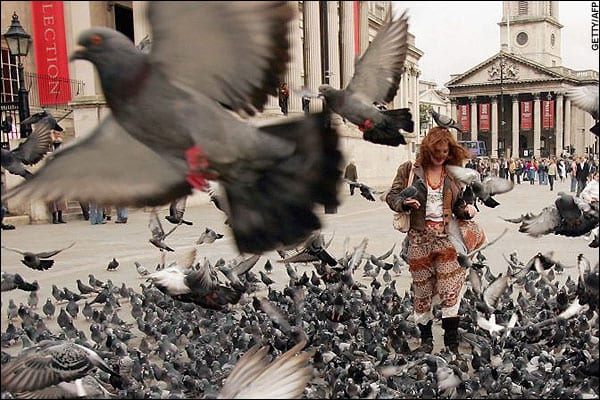
by Pigeon Patrol | Jul 20, 2023 | Bird Spike, Pigeon Predators, Pigeon Spikes, Pigeons, Pigeons in the News, Raccoons, Sparrows, UltraSonic Bird Control
Brussels is massively dispensing contraceptive corn pellets to pigeons in the region in an effort to humanely reduce the ever-growing population.
Pigeons are a nuisance for many reasons, but their droppings, aside from being an eyesore, also cause material damage. The highly acidic excrement can erode materials such as marble, limestone and concrete, according to reports from Bruzz.
And the cost of cleaning excrements is no less eye-watering, costing between €16 and €23 per pigeon every year.
The region has tried various methods to control the pigeon population for decades but is now stepping up measures. Since the start of last month, the catching and killing of pigeons – a tactic used in the past – was banned. Another control method, the surgical sterilisation of pigeons by the City of Brussels was previously banned on grounds of cruelty.
The City of Brussels is now turning to the R-12 pigeon pill: a corn pellet coated with a medicine that helps birds against parasites as well as with a contraceptive component. It is already used in Laeken and Ixelles, as well as Leuven.
At Square Clémentine, where the first seed dispenser was installed in 2019, the population dropped by 30% from 180 pigeons in February 2019 to 130 pigeons one year later. By July 2020, it had halved.
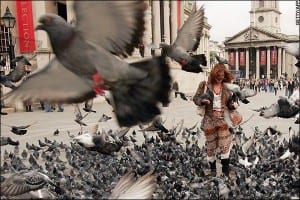
Who Ya gonna Call!!
Targeted action
This method is already used in other European cities, such as Barcelona. To distribute the pellets, the municipality works together with Limburg-based Vets for City Pigeons.
“We work with maize pellets treated with R12 or nicarbazine,” the company’s vet Pieter Colla told Bruzz. “Nicarbazine is actually a product against intestinal parasites. But it has the side effect of making pigeons infertile because it prevents fruit from developing in the eggs.” He stressed that the pellets have no harmful effect on the environment, as they aren’t real hormonal products.
He added that this corn is only given to dominant pigeons, about 15% of the local colony, as they are the ones engaged in reproduction. This is done via automatic dispensers which switch on one hour after sunrise every day. The pellets are then dispensed to dominant pigeons that have been conditioned to eat them.
The effect of the pill disappears in around six days, after which the animal can reproduce, meaning the dispensers have to continually be refilled. If uncontrolled, city pigeons can have up to 12 young per year.
In the coming few weeks and months, more dispensers will be placed across the city, mainly in places where the city received the most complaints about the animals.
Source
Pigeon Patrol Products & Services is the leading manufacturer and distributor or bird deterrent (control) products in Canada. Pigeon Patrol products have solved pest bird problems in industrial, commercial, and residential settings since 2000, by using safe and humane bird
deterrents with only bird and animal friendly solutions. At Pigeon Patrol, we manufacture and offer a variety of bird deterrents, ranging from Ultra-flex Bird Spikes with UV protection, Bird Netting, 4-S Bird Gel and the best Ultrasonic and audible sound devices on the market today.
Voted Best Canadian wholesaler for Bird Deterrent products ten years in a row.
Contact us at 1 877-4-NO-BIRD,(604) 585-9279 or visit our website at www.pigeonpatrol.ca
Pigeon/Pigeon Patrol / Pigeons Roosing / Vancouver Pigeon Control / Bird Spikes / Bird Control / Bird Deterrent / PIgeon Deterrent / Surrey Pigeon Control / Pest / Seagull deterrent / Vancouver Pigeon Blog / Birds Inside Home / Pigeons in the cities / Ice Pigeons / What to do about pigeons / sparrows, Damage by Sparrows, How to Keep Raccoons Away, Why Are Raccoons Considered Pests / De-fence / Pigeon Nesting / Bird Droppings / Pigeon Dropping / woodpecker control / Professional Bird Control Company / Keep The Birds Away / Birds/rats/seagull/pigeon/woodpecker/dove/sparrow/pidgeon control/pidgeon problem/pidgeon control/flying rats/pigeon problems/ bird netting/bird gel/bird spray/bird nails/bird guard
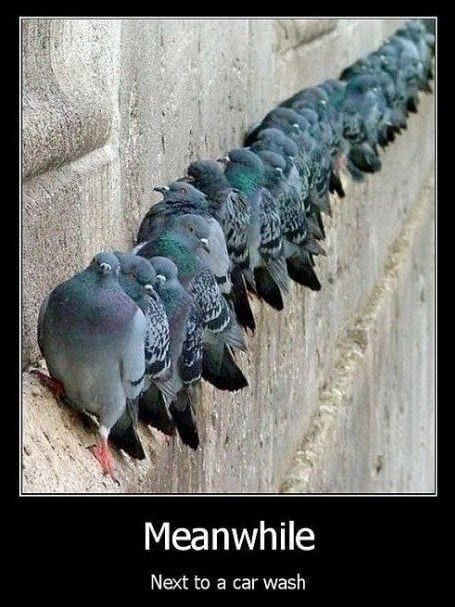
by Pigeon Patrol | Jul 20, 2023 | Bird Spike, Pigeon Predators, Pigeon Spikes, Pigeons, Pigeons in the News, Raccoons, Sparrows, UltraSonic Bird Control
Once used to deliver messages, these days pigeons are often reviled as urban pests.
The birds, common in major cities such as Paris and London, can often be seen struggling to walk due to missing toes and deformed feet.
Now a team of researchers in the French capital have come up with an interesting explanation for the phenomenon.
Previous research had suggested pigeons lose toes due to infections or chemical pollutants, but a new study by scientists from the National Museum of Natural History (MNHN) and the University of Lyon suggests that human hair may in fact be a culprit.
Study co-author Frédéric Jiguet, of MNHN, told CNN he came up with the idea for the study after noticing mutilated pigeons as he walked through the Jardin des Plantes, a botanical garden, in Paris.
“Pigeons have a very bad reputation in Paris, and actually everywhere in the world,” said Jiguet.
“People get confused, they think pigeons are dirty because they see them wandering about with stumps for legs, wandering through rubbish.”
However, the birds are actually “victims of our pollution, of our activities,” said Jiguet.
Researchers studied the extent of pigeon toe mutilations at 46 sites around the French capital.
Jiguet and the team found that toe mutilation “tended to increase with the density of hairdressers,” according to the study.
Jiguet said pigeons could lose digits which get stuck in human hair, a phenomenon known as “stringfeet.”
“When they walk, they can trip on strings or hair,” he said.
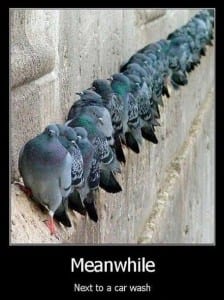
“The string might just fall, but sometimes it forms a knot around a toe, and in the end the toe dies and falls off.”
Pigeons also have fewer toes in areas with more air and noise pollution, providing a useful gauge for the quality of urban environments.
Jiguet said that the study showed “the more human activity in an area, the less toes pigeons have” and “the more green spaces, the more toes they have.”
“It would be interesting to look in all major cities in the world, to look at how many toes pigeons have in order to estimate the quality of the environment and of the pollution,” added Jiguet.
The study was published in the journal Biological Conservation.
Source
Pigeon Patrol Products & Services is the leading manufacturer and distributor or bird deterrent (control) products in Canada. Pigeon Patrol products have solved pest bird problems in industrial, commercial, and residential settings since 2000, by using safe and humane bird
deterrents with only bird and animal friendly solutions. At Pigeon Patrol, we manufacture and offer a variety of bird deterrents, ranging from Ultra-flex Bird Spikes with UV protection, Bird Netting, 4-S Bird Gel and the best Ultrasonic and audible sound devices on the market today.
Voted Best Canadian wholesaler for Bird Deterrent products ten years in a row.
Contact us at 1 877-4-NO-BIRD,(604) 585-9279 or visit our website at www.pigeonpatrol.ca
Pigeon/Pigeon Patrol / Pigeons Roosing / Vancouver Pigeon Control / Bird Spikes / Bird Control / Bird Deterrent / PIgeon Deterrent / Surrey Pigeon Control / Pest / Seagull deterrent / Vancouver Pigeon Blog / Birds Inside Home / Pigeons in the cities / Ice Pigeons / What to do about pigeons / sparrows, Damage by Sparrows, How to Keep Raccoons Away, Why Are Raccoons Considered Pests / De-fence / Pigeon Nesting / Bird Droppings / Pigeon Dropping / woodpecker control / Professional Bird Control Company / Keep The Birds Away / Birds/rats/seagull/pigeon/woodpecker/dove/sparrow/pidgeon control/pidgeon problem/pidgeon control/flying rats/pigeon problems/ bird netting/bird gel/bird spray/bird nails/bird guard
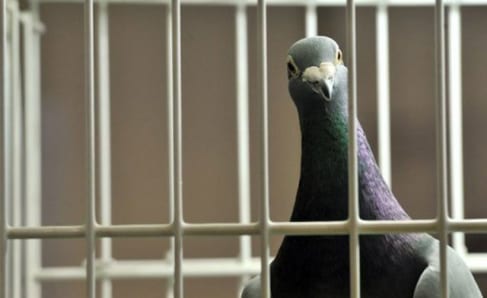
by Pigeon Patrol | Jul 20, 2023 | Bird Spike, Pigeon Predators, Pigeon Spikes, Pigeons, Pigeons in the News, Raccoons, Sparrows, UltraSonic Bird Control
Sick of sea gulls? Petrified of pigeons? Bothered by birds? Have you been stepping in excessive amounts of bird poo around your home or business?
This guide is packed full of everything you need to know about bird management in the UK. The guide includes why we sometimes have to control birds, how to deter birds, and how to get rid of them if you have an infestation.
Whether you’re thinking about doing some DIY bird control or you’re looking to enlist the help of a professional bird management company, this guide is for you.
We love British birds. Every wild bird and their eggs in the UK is rightfully protected by law under the Wildlife and Countryside Act 1981.
There are hundreds of species of birds in the UK. Having birds visit your garden is a wonderful treat, and we’re all happy to see them.
Unfortunately, a few species of birds come into direct conflict with humans when they take roost in or around our homes or businesses. These birds can cause real problems, including excessive nuisance and public health concerns.
Urban birds such as gulls and pigeons are great opportunists. Handed a ready food source and sheltered nesting site, these birds can grow rapidly and what initially attracted a few birds can soon become a thriving colony.
That’s when a professional can step in and help you control and manage pest birds.
The dangers: why control birds?
Pathogens and diseases
There are more than 110 pathogens reportedly carried by pigeons, and there is plenty of research to suggest other wild birds pass on diseases to humans.
Some of the more common diseases and pathogens that birds can spread:
| Air-borne diseases |
Food-borne disease |
| Chlamydia psittaci (Ornithosis) |
Salmonella spp. |
| Cryptococcus neoformans |
Escherichia coli |
| Histoplasma capsulatum |
Campylobacter jejuni |
| Allergenic particles (bird fancier’s lung) |
Listeria monocytogenes |
|
Vibrio cholerae |
In 2019, two patients died in a Glasgow hospital who had contracted a cryptococcal fungal infection which was subsequently linked to pigeon droppings.
Diseases can be transmitted from bird droppings and the birds themselves.
When dry, pigeon droppings can become airborne in small particles, which can lead to respiratory complaints.
You should always wear appropriate personal protective equipment (PPE) when cleaning up bird droppings.
Food-borne bacteria can be spread to humans if you have poor food hygiene standards or come into direct contact with droppings (wash your hands straight away)!
Pigeons, gulls, house sparrows and starlings have the potential to carry food-borne diseases – it is therefore essential to keep them away from food manufacturers and distributors.
Safety concerns
All bird droppings can be slippery and can cause a serious risk on pavements, particularly under roosting birds.
As funny as it might seem to see a gull steal someone’s chips at the seaside, gulls can pose a serious safety concern.
During the breeding season, gulls have been known to attack people unprovoked. Gulls have the potential to startle and even draw blood when they attack.
All birds have the potential to cause real problems on airfields. When birds are sucked into plane engines (bird strikes) – while rarely fatal – they can cause damage to aircraft and emergency landings.
Damage to property and brickwork
Bird droppings are acidic and can corrode and erode metals, stonework and brickwork.
Nesting materials birds use can block chimneys, flues and guttering, causing possible issues with carbon monoxide and damage to buildings as water overflows from blocked gutters.
Buildings covered in fouling looks unpleasant, can smell, and projects a poor image of a business, potentially ruining an organisation’s reputation. If customers spot evidence of a bird infestation on your premises, they may not want to do business with you.
A professional pest management company can help protect your building using proofing and bird deterrent measures.
Secondary insect infestations
Where birds go, so too go the parasites that live on them. Bird mites, ticks, fleas and beetles can all cause complicated secondary infestations.
If you have a current or past problem with birds, you may find you’ll suffer from a parasite infestation too.
These little critters can quickly multiply into thousands, leaving you feeling overwhelmed.
The relentless biting, itching, crawling sensation and lack of sleep are the physical symptoms that can propagate a whole host of secondary mental health issues.
Bird mites are parasitic arthropods feed on living organisms. It is the female mite that needs a blood meal to reproduce viable eggs. They are attracted to mammals by receptors for moisture, heat and CO2, and they often bite humans when their original food source has gone – like when the young birds leave the nest.
If you have a parasite issue because of a bird infestation, contact a professional pest management company as soon as possible.
Birds around businesses
If you have birds roosting in and around your business then you’ll want to seek professional help as soon as possible.
In the UK, allowing birds to infest a food business violates the Food Safety (General Food Hygiene) Regulations 1995, and could result in prosecution of the food company.
If you don’t address health and safety hazards, you could be putting your staff and customers at risk.
By investing in a professional bird management contract, you can save money in the long run by reducing damage to your property or stock.
The reputational damage caused by a bird infestation can be catastrophic. Bird droppings make any business appear unclean and imply a state to disrepair.
Would you choose to use a company covered in dangerous poo?
Find a professional to help stop bird infestations at your work and protect your business today.
Birds control licences and the law
The Wildlife and Countryside Act 1981 protects all wild birds, their nests and eggs.
However, specific exemptions permit certain species to be controlled by particular methods for specific reasons.
This exemption is given in the way of a wildlife licence issued by Natural England, Natural Resources Wales, Scottish Natural Heritage or Department of Agriculture, Environment and Rural Affairs.
General licences are issued to allow certain actions to be carried out that would otherwise be illegal under the legislation, without the need for people to apply for a specific licence.
Individual licences are sometimes granted for specific situations not covered by a general license. These do need to be applied for.
The law only allows competent people such as professional pest controllers to deal with certain species.
You should always consult with a professional before you consider any form of bird control measures, as the list of birds that are considered pests can change regularly.
You can be prosecuted in the UK if you illegally interfere with a bird, it’s nests or eggs and you’re not doing under a wildlife licence.
Signs of a bird infestation
What do you need to look out for to spot a bird infestation? Some bird species like pigeons and gulls have adapted to live around us.
By their nature, birds will normally be at height keeping away from us.
Here are the seven signs that you have a bird problem:
- Spotting lots of birds settling on roofs or ledges
- Loud bird noises and cries from young chicks
- Finding nesting materials thrown about your home of business
- Damaged stock from pecking
- Bird fouling/droppings
- Blocked guttering and drainage systems with feathers and nest materials
- Secondary infestations from bird parasites (such as bird mites).
Types of birds that can be a pest
While most species of birds coexist with humans and rarely come into conflict with us, some species of birds in certain situations are considered pests.
It’s important to note that even species typically considered “pest birds” are protected by law.
Control of feral pigeon (Columba livia)
The feral pigeon is a widespread pest bird found in cities, towns and rural settings in the UK and around the world.
Pigeons can harbour a large variety of diseases and insects on their bodies. Its nests and fouling are also public health concerns.
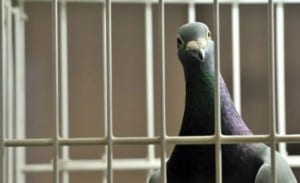
Biology of a pigeon
Feral pigeons originally descended from domesticated rock doves. The population is supported by escaped racing pigeons.
Pigeons usually make their nests in bridges, buildings or any structures with easily accessible shelter.
Males and females help build nests out of grass, twigs, features and even litter such as plastics and wire. The nests can be quite large and quickly become thick with droppings.
Depending on breeding conditions, pigeons can have up to seven broods (birds produced at one hatching) in their breeding season between March and July.
Two eggs hatch in around 18 days. With access to enough food, the young pigeons will become independent adults in just 30 days.
More eggs can be hatched before the young have even left the nest, meaning a population can quickly grow.
Wild pigeons will live up to four years, relying on human food scraps and spillages, or taking from newly sown farmland.
Behaviour of a pigeon
You’ll often see pigeons in town centres feeding in huge flocks, ranging in size from 50 to 400-plus birds.
Pigeons have a social order, so the more dominant birds feed first and get the best breeding sites.
Management and control of pigeons
The best way to get rid of pigeons is to remove a food source.
Cover bins, clean up spillages and restrict access to food. Most importantly – don’t feed the pigeons!
Proofing with nets, spikes and mesh can stop pigeons perching and roosting in structures.
Scaring techniques rarely work with pigeons. Visual and audio scaring doesn’t tend to work very well or for very long. Pigeons adapt very quickly to new things.
Flying birds of prey regularly can be useful.
Lethal control can be an option when a bird has entered a food premises or overcome the proofing measures.
Culling pigeons to reduce flock sizes is rarely successful unless access to food is restricted, otherwise population numbers soon recover. This should only ever be done as a last resort and in accordance with a wildlife licence (general or individual) issued by an appropriate government department.
How to prevent and deter birds
All urban birds require is:
- A nesting/ roosting sites (eg balconies, window ledges and roof areas of surrounding buildings)
- A reliable food source.
Removing bird food sources or blocking off sites where they perch or roost is the best way to prevent birds causing a problem.
The number of birds attracted to an area will depend on what food is available.
All of these methods of proofing have their merits and some can offer a stronger and more lasting deterrent, but as with any method of control, they may become less effective over an extended period of time.
Flying a bird of prey can be a great way of deterring birds from a certain area.
For a heavy bird infestation, your professional contractor may have to employ methods of control such as egg and nest removal, shooting, trapping or flying of predatory birds.
Therefore if birds are being fed, more will be attracted to that area, so food sources must be kept to a minimum. Keep your bin lids closed and cover compost bins.
Source
Pigeon Patrol Products & Services is the leading manufacturer and distributor or bird deterrent (control) products in Canada. Pigeon Patrol products have solved pest bird problems in industrial, commercial, and residential settings since 2000, by using safe and humane bird
deterrents with only bird and animal friendly solutions. At Pigeon Patrol, we manufacture and offer a variety of bird deterrents, ranging from Ultra-flex Bird Spikes with UV protection, Bird Netting, 4-S Bird Gel and the best Ultrasonic and audible sound devices on the market today.
Voted Best Canadian wholesaler for Bird Deterrent products ten years in a row.
Contact us at 1 877-4-NO-BIRD,(604) 585-9279 or visit our website at www.pigeonpatrol.ca
Pigeon/Pigeon Patrol / Pigeons Roosing / Vancouver Pigeon Control / Bird Spikes / Bird Control / Bird Deterrent / PIgeon Deterrent / Surrey Pigeon Control / Pest / Seagull deterrent / Vancouver Pigeon Blog / Birds Inside Home / Pigeons in the cities / Ice Pigeons / What to do about pigeons / sparrows, Damage by Sparrows, How to Keep Raccoons Away, Why Are Raccoons Considered Pests / De-fence / Pigeon Nesting / Bird Droppings / Pigeon Dropping / woodpecker control / Professional Bird Control Company / Keep The Birds Away / Birds/rats/seagull/pigeon/woodpecker/dove/sparrow/pidgeon control/pidgeon problem/pidgeon control/flying rats/pigeon problems/ bird netting/bird gel/bird spray/bird nails/bird guard










